#ultimate beloved queer coded mean girl
Text
Jane Austen was so insane for writing Emma I’m losing my mind
Like you have the mean bossy femme lesbian in her late 20’s, living off her trust fund and becoming hyper-obsessed with a local pretty peasant girl Jennifer’s Body style. People call her perfect, and she knows they’re right
(They’re wrong. Her childhood best friend - her metaphoric conscious - reminds her every day.)
She’s the protagonist of this book but the antagonist of every other: she’s Caroline Bingley, Blanche Ingram, Cordelia Chase, Regina George, Heather Chandler. She’s the queen of this school, and popularity is a hell of a drug.
(Popularity is the only power she has. There’s something itching at the back of her brain: She doesn’t want to be this. She doesn’t want to do this. Why is she trying to impress all these mean people.)
She can do no wrong. She mocks the annoying weird girl and everybody laughs and the weird girl finally shuts up.
(He’s frowning at her in the background. She’s frowning at herself. She’s angry at both of them)
People think she’s charming and beautiful and so kind.
(They’re wrong.)
She keeps everybody at arm’s length, staying mean and fiercely independent.
(They can’t see her loneliness. Her failures. The way she watches her pretty new friend laughing joyfully and beautifully in the sun, and it just makes her feel sad.)
She plays Cupid because she sees people as her play things - love is just a game for her.
(She plays Cupid because she knows that everybody will leave her in the end, anyways. This just allows her to control it.)
Jane Austen famously called Emma “a heroine whom no one but myself will much like.”
(I like her too)
#emma#Jane Austen#I’M VERY NORMAL ABOUT EMMA#ultimate beloved queer coded mean girl#jane austen said ‘i want to take this mean girl and study her for science’ and that’s such a mood#uh this post got out of hand. i might just be gay for emma.#also yes Emma is actually 21 this is a vibes ONLY post
308 notes
·
View notes
Note
PLS PLS LIST THE SWAPS!! TELL ME ABOUT THE SIBLINGS AND ALSO HIFUMI BECAUSE I LOVE HIM (IF YOU WANT!) I will also send more questions in the morning too, excited to see what you’ve been working on!!
OK OK OK !!!!! AHH! So, before assigning talents, I swapped the pools, so for the first game, I use the talents from the second game, and vis versa! For some i listed gender, sexuality, or neurodivergencies, though this isn’t all of them, and I haven’t developed them all to the same level!
This is SO long. I didn’t even bother mentioning things like my plans for the killing games. (I have DR1 planned out in full, but only parts of DR2 and the v3 anime)
THANK YOU FOR THE ASK MY HEART SKIPPED A BEAT IN HAPPINESS WHEN I SAW I HAD NEW ASK NOTIFS!!
LIST:
Trigger Happy Havoc (first game)
Kyoko Kirigiri- Ultimate Luckster- Mastermind (: Sometimes lesbians can be evil okay! was trained as a detective like everyone in her family and didn’t get the ultimate :) she’s definitely not mad about that :) her luck cycle depends on how far she plans things ahead. her good luck is when she’s spontaneous! She hates when ‘normal’ people are accepted by ultimates.
Makoto Naegi- Photographer (Mostly wildlife and nature photography, with Sayaka helping him for some animal photography (: trans and bi <3 One of sayaka’s birds nests in his hair like all the time)
Kiyotaka Ishimaru- Ultimate Swordsman (AUTISTIC ICON, has trained in kendo since he was a kid, then was essentially given away to the Fujisaki clan by his very stressed dad. Semiverbal, rarely speaks.)
Chihiro Fujisaki- Ultimate Yakuza (Taka is her bodyguard! His family is in debt to hers, the Fujisaki clan is the most powerful in Japan. trans icon, of course, dates Sayaka! Very direct, though she’s far more delicate and polite when talking to taka, her best friend)
Sakura Oogami- Ultimate Nurse (Works as an EMT- her clan still is in martial arts, so she’s still very buff, she assists in injuries at the family dojo. Autistic Icon)
Asahina Aoi- Ultimate Gamer (ULTIMATE ADHD. streams and has a ton of fun, will ramble while breaking records, demigirl who loves her girlfriend sakura :)
Mukuro Ikusaba- Ultimate Chef (Works best with ‘cheap’ food, and making them taste good. a byproduct of growing up on the streets with junko, and junko being bored of the same old food they dug out of the trash. now works closely with junko for her teams’ nutritional needs! autistic and sapphic.)
Junko Enoshima- Ultimate Team Manager (there are SO many sports she can never get bored, and the professional scene is always changing! prefers coaching womens’ teams, because being an ultimate brings them more publicity and usually higher pay :)
Mondo Oowada- Ultimate Prince (OH MY BOY. trans adhd icon. now the crown prince of Novoselic, with a reagent in his place until he comes of age. His service dog Chuck is a maltese and an absolute sweetheart. Chihiro takes him under her wing to teach leadership. also dates taka later OF COURSE, though they’re poly and I may add more ppl to their relationship later.)
Celestia Ludenburg- Ultimate Musician (specializes in violin, most strings, though she can play any instrument. grew up poor, dedicated herself to an instrument and persona to cope)
Byakuya Togami- Ultimate Musician (Yep. two musicians. two catty trans gay icons about to throw down. they HATE each other and grew up as rivals. specialize in classical, they literally tore a professional orchestra full of grown adults apart trying to make them side with who was the best musician. they’re so good that they’re matched, and Hope’s Peak accepts them as one student and combined ultimate. they room together. they fight. Literally if one of them gets expelled, the other does too, so they’re STUCK. eventually they become literally inseparable and insufferable together like the WORST siblings. I love them.)
Sayaka Maizono- Breeder (animal handler) (Specializes in birds!!!!!! has songbirds on her shoulders all the time. will give unsettling animal facts without realizing they’re unsettling. sends her songbirds to serenade chihiro when they start dating <3)
Yasuhiro Hagakure- Gymnast (you see this tall goof who acts like an older brother to everyone and wonder HOW he’s a gymnast. he’s completely different in competitions, though still lighthearted. becomes a big brother figure to mukuro and junko especially <3 also trans bc i say so.)
Leon Kuwata- Traditional Dancer (he just. kinda hates it. it takes SO much work and effort but he takes to it naturally. his cousin kanon is NOT like in canon, instead she’s helpful. he’d literally rather be doing anything else. doesn’t know how to do anything like... basic either. can’t cook. cant do his own laundry. everything was dedicated to traditional japanese dancing before he attended HPA.)
Toko Fukawa- Engineer (writes schematics and is very good at it. gets VERY upset when her plans go wrong. her notes are orderly and perfect. host for their system!)
Syo- Mechanic (a factive of genocider syo, NOT an actual killer. she’s a protector mainly, and also is more adept at hands on skills when it comes to fixing things, her hands are less shaky. Her notes are a disaster and she does it to spite Toko.)
Hifumi Yamada- (???) (reserve course) Protagonist! My BOY. HIFUMI IS GOOD OKAY. He’s autistic and loves anime and gaming! he’s not particularly ultimate-leveled at them, or anything else! Attending Hope’s Peak as a reserve course student! At one point he joins the student council as a reserve course representative even if he’s only a freshman :) He’s also a moderator in Hina’s livestream chat, under the username of JusticeHammer, fastest ban hammer this side of the internet. He's internet friends with hina and sakura, and doesn’t realize Oh We Go To the same SCHOOL until he bumps into them. and realizes hina doesnt know what he looks like. but sakura does. its hilarious. he’s aroace, and during the year they’re locked in HPA, is in a queer platonic partnership with Hina and Sakura, while they’re dating each other. it’s great.)
Goodbye Despair! (second game)
Peko Pekoyama- Lucky student (ohohoh. her luck relies on her conviction. if she has doubts her bad luck strikes HARD. trans!, was taken in by Fuyuhiko’s family when she was a baby, grew up as just another kid in the family. They all expected Fuyu to go off to HPA on his own and then BOOM acceptance letter)
Fuyuhiko Kuzuryu- Programmer (He. gets so angry while coding. He has an array of rubber ducks to talk to and work through his coding issues with. trans of course. Very protective of Peko when people say she doesn’t have a ‘real’ ultimate. ADHD and Autistic)
Sonia Nevermind- Writer (Literary Girl) (Her family immigrated to Japan when she was young! She writes a lot of serial killer novels, murder mysteries and horror and all that! Trans and bi :)
Gundham Tanaka- Detective (YEAH my guy is a detective. still talks Like That. Trans and bi and he and Sonia were kinda-dating (t4t autistic power couple in the making) when things started happening. He spends some time with his cool older sister who he looks up to a LOT. He and Sonia talk through things together a lot, they both have those red string walls, one for murder cases, another for a fictional plot lmao.)
Mahiru Koizumi- Moral Compass (my GIRL. autistic. Her morals rely a lot on people taking responsibility and being reliable, and she ends up having to work through some biases she didn’t realize she had when she arrived at HPA. Is still protective of Hiyoko, though that protectiveness is spread a bit thinner to extend to the rest of the class.)
Hiyoko Saionji- Clairvoyant!!! (HI YES I COULD TALK ABOUT HER FOR DAYS. Has actual visions in dreams and when she suddenly faints, but doesn’t really realize they’re uhh Real Visions for a WHILE. uses her status as an ultimate clairvoyant to trick and bully kids when in school for a LONG time, though her homelife wasn’t great with her grandmother trying to find ways to make her visions more consistent. SHES ALSO 12 WHEN SHE JOINS THE 77TH CLASS. she’s just so advanced in academics and her ultimate is so interesting hope’s peak cant HELP but scout her early. she has SO many issues guys no one appreciates hiyoko enough, autistic gifted kid hiyoko my beloved.)
Akane Owari- Gambler (started gambling to help out her family and Got Good at it. is very very conscious of money and food like all the time. Runs the hope’s peak betting pools once she arrives. these ultimates bet on a lot of things. she ALWAYS wins. until she doesnt!!!)
Mikan Tsumiki- Martial Artist (ohhhh Mikan. Still anxious and clumsy (though not like THAT in canon) and literally no one looks at her and thinks Oh The ULTIMATE martial artist?? it isn’t until you see her in the ring that you understand. She started learning self defense as a kid because her (bad) parents essentially said she had to rely on and protect herself and no one else would help.)
Kazuichi Souda- Pop Idol (OH TRANS ICON? he’s nervous and paranoid about Everything still, though now it’s like. oh the entire world is always watching my every move this is Okay (: has the brightest neon album eras. he literally keeps up a like. weird chad persona when interacting with people because he’s masking how hard he’s constantly just internally screaming.)
Nagito Komaeda- Soldier (AHAHAH my mans got issues problems disorder he’s a messssss, this trans guy, this absolute gay. this boy leveled a city of thousands of people with his own hands and some bombs. Still has medical issues, but most of his like. treatments and medicine is hold hostage as long as he stays in line. believes the ends justify the means and anyone who dies to him is obviously weak, because look at him! he’s weak, but that doesn’t matter because he doesn’t have to be the strongest, he just has to be stronger than the weakest scum.)
Chiaki Nanami- Heir (OOF. Agender, uses any pronouns. Doesn’t really. enjoy being the heir. grew up with Byakuya in the same circles. she treats the economy and stock market and stuff like games. enjoys gaming but isn’t good at them. collects so many things. has halls full of collections. Her parents stopped controlling her once she was able to prove she had more money than them and could literally bankrupt them if she wanted.)
Hajime Hinata- Baseball Star (Chiaki’s best friend, his family was upper middle class until he hit it BIG as a baseball star. wants to do BIG things and wants to attend hope’s peak more than anything!! Doesn’t really think of baseball as his THING, just a means to an end! trans :)
Teruteru Hanamura- Biker Gang Leader (started with shaking down some jerks who didn’t pay their food and drink tabs at his mama’s restaurant. now he RUNS their tiny town. His siblings are essentially gang mascots, he works hard to keep them out of trouble (while bringing them to like. meetings where he ends up beating a dude almost to death. its fine). most of what he does it to get more money to keep the restaurant afloat and care for his mama with her health conditions.)
Nekomaru Nidai- Fashionista (the drama. the CHAOS. most people are like ohhh we can never understand this artistic genius when he’s literally just. vibing and has ADHD and a love for coffee. Works a lot on accessible clothing lines for disabled people! Also he and Kazuichi work together sometimes, Nekomaru is good at calming Kaz down and seeing like, the root of whatever problem and making it better. ALSO A TRANS ICON and just flaunts it.)
Imposter- In the hope’s peak days they are impersonating Ryota Mitarai, as a part of the 77th class. In the Killing Game they impersonate Mondo Oowada as the Ultimate Prince. They’re doin’ their best.
Ibuki Mioda- (???) (Izuru Kamakura) Protagonist! Gundham Tanaka’s older sister (though they’re in the same school year). Nonbinary and using just. an array of pronouns alongside she/her, and jokingly fights with gundham for neopronouns like MOM said it’s MY TURN on the rawrself pronouns. She attends the reserve course to stay at her brother’s side. She dresses loudly and acts even louder because !!! she wants to stand out!! in the middle of this drab reserve course hell!! but when things go down, she wants to be someone, to be worthy of being her amazing brother’s big sister. so she accepts some offers.
NON-KILLING GAME:
Ryota Mitarai- Ultimate Analyst (stays in his room. He’s terrified of the outside world but fascinated by it. watches hope’s peak academy through security feeds, picking up on little details. he just wants to understand things but never looks at the big picture.)
Chisa Yukizome- Ultimate Boxer (Homeroom teacher!! She’s working really hard and believes in everyone! Some are intimidated by talent, but she’s never hurt anyone outside of the ring! Dating Kyosuke)
Juzo Sakakura- Ultimate Student Council President (Has anger issues, though his work at reigning them in assisted in becoming an Ultimate. Was responsible for security and the Hope’s Peak student council. Dating Kyosuke)
Kyosuke Munakata- Ultimate Housekeeper (Meticulous, works himself to the BONE even if he’s good enough to not have to do that. Is working on establishing another Hope’s Peak! Dating Chisa and Jozu!!!)
Seiko Kimura- Ultimate Blacksmith (GIVE MY GIRL KNIVES!! She’s an anxious gal, always wearing a facemask that filters the air in her forge because she has some respiratory problems. she prefers making more decorative pieces like an artist, but sometimes can create utilitarian pieces or tools to fit specific needs. Still a doormat)
Ruruka Ando- Ultimate Pharmacist (She constantly asks Seiko for new tools for her developments in medicine, saying its all for the advancement of humanity, so Seiko denying any request is SELFISH, though she never thinks to make anything for seiko’s health issues. Dating Izayoi. Specializes in medicine for mental health. Not Doing Great :)
Sonosuke Izayoi- Ultimate Confectioner (He loves sweets. LOVES them. Creates things that look plain, ordinary. but taste so GOOD you CRY and maybe ascend for a little bit. sometimes Ando makes cool new drugs to put in the sweets, who knows! It’s a mystery! He always has like. a huge refrigerated case of fresh cakes, and constantly has a lollipop in his own specialty recipe in his mouth.)
#ask#former-champion#danganronpa#danganronpa trigger happy havoc#super danganronpa 2#I could tag every character but consider this: ITS 3 AM IT TOOK ME OVER AN HOUR TO WRITE THIS#not wizzy#dangan ronpa
36 notes
·
View notes
Text
It Chapter Two: Aged-Up Protagonists and the Umbridge Effect

Writing reviews, metas, and the like is a lot about timing. If you don’t craft your writing in the immediate aftermath of your source’s release, someone else will beat you to it and, chances are, your audience will be less enthused about reading the same arguments weeks later. (Admittedly, that’s up for debate. I for one am happy to read about the same shit for years on end.) Thus, when I didn’t have the time or the mental energy to write about It: Chapter Two immediately after seeing it in theaters, I knew within a few days that I’d lost a lot of ground. Fans and critics alike have already spoken about the film’s major draws, namely the update on Richie’s sexuality and the canonizing of a beloved, thirty-year-old ship. We’ve also covered the issues that arose out of those positives. In 2019, is it necessary to show a hate crime in such violent detail? By giving us queer characters, have Muschietti and King unintentionally fallen into the trap of treating them badly? One is dead and the other mourns while the straight couple passionately kiss beneath the lake. Faithful adaptation vs. modern activism is a tricky balance to strike. I could rehash all those arguments here, but why bother? They’ve been articulated better by others already. Besides, falling behind means that I now have the space to discuss something just as important to me.
The Losers’ ages.
Now, I���m not sure if you all have noticed, but fantasy adventures aren’t really geared towards adults. That is to say, stories often contain adult content, but that’s not the same thing as putting adults at the center of the narrative. I’ve experienced a niggling sense of displeasure that’s grown stronger with each passing year and it took until my mid-twenties to figure out what it was: I am no longer the hero of many of my favorite stories. Because I’ve grown up. Harry Potter is concerned primarily with the trials and tribulations of characters between the ages of eleven and eighteen. If we return to that world---such as through a certain cursed play---the focus must shift to the new, shiny generation. Anyone who falls through a wardrobe is bound to be a child and if they dare grow up? They’re no longer allowed access to such a fantastic place. Kids are the ones who find the Hundred Acre Woods, or fall down rabbit holes, get daemons, battle Other Mothers when the world gets flipped, or head off onto all sorts of elementary and high school adventures. Sometimes, even those who are adults mistakenly get caught up in this trend. Frodo might be in his fifties, but as a small, kindly hobbit he comes across as younger than the rest of the Fellowship. Since the release of Jackson’s trilogy I’ve corrected more than one new fan who assumed (somewhat logically) that he is in his early twenties, max. It’s an easy mistake to make when we’ve grown accustomed to children and young adults taking center stage in so many fantastic, high-profile adventures.
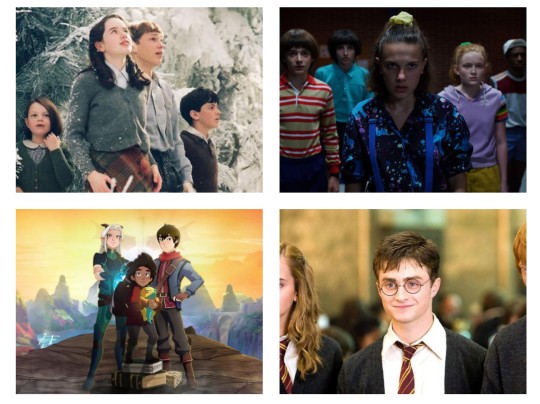
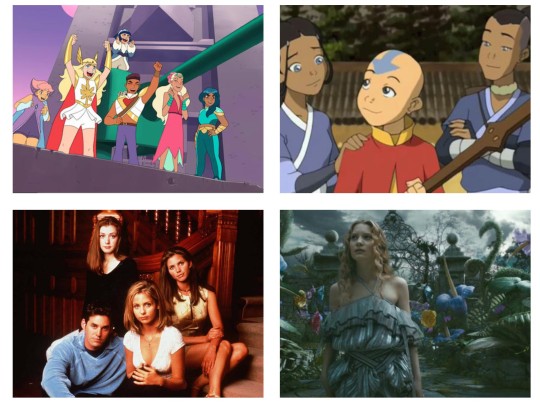
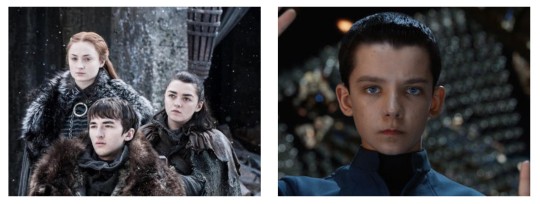
Of course, there are plenty of counters to this feeling. Just look at Game of Thrones. Though we see much of the story through younger perspectives---such as the Stark siblings---the vast majority of the cast is made up of adults, playing just as pivotal a role as the up-and-comers. Fantasy, Science Fiction, and other speculative story-lines are by no means solely in the hands of minors, yet I think it’s also worth acknowledging that a good majority of those stories do shape our media landscape. Or, if they’re not strictly minors, they’re characters who embody a sort of static young adulthood, the Winchesters and the Shadowhunters and all the television superheroes who might gesture towards markers of adulthood---we have long term relationships, hold down jobs, can impersonate FBI agents without anyone batting an eye---yet are still able to maintain a nebulous form of youth. They all (try to) look and act as if they’re right out of college. The standards of film and television demand that actors appear twenty-years-old even when they’re pushing forty, and the standards of much literature insists that twenty is simply too old for an adventure, period. I can still clearly recall two moments of shock (later agreed upon by my friends) when I encountered unexpectedly older protagonists in genre fiction: the realization that Sophie actually spends the majority of Howl’s Moving Castle as a very old woman and that The Magicians takes place in graduate school. “Wow,” I remember thinking. “When’s the last time that happened?”

What does all this have to do with It: Chapter Two? I don’t have any big twist for you here. It was just really refreshing to see such a fantastical story where our cast is all forty or older. Seriously, can we take a moment to appreciate exactly how much King undermined expectations there? The first half of the novel is structured precisely how we assume it ‘should’ be. There’s a mysterious threat, there are children caught up in the middle of it, and ultimately only they are capable of saving the day. We know this story. We even have the characterization of the town itself to reinforce this structure, a place so warped by evil that only the very young with their open-mindedness and imagination are capable of seeing Derry for what it truly is, illustrated beautifully in the film by Mr. Marsh straight up not noticing a whole room full of blood.
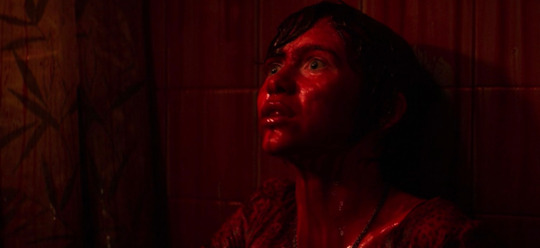
Though they’re It’s prey, children are also the only ones who have any potential power over him. You have to be able to acknowledge a problem in order to fix it and King could have easily ended his story at the first chapter alone, with the group somehow managing to defeat Pennywise for good the first time they set foot in the sewers. A part of me is still shocked he didn’t, if only because the young savior as an archetype was embedded within Western culture far earlier than It’s 1986 publication. From Carrie to The Girl Who Loved Tom Gordon, Pet Sematary to Firestarter, King is no stranger to putting children at the center of fantastic tales. Yet he’s also given us numerous adult protagonists, managing to find an enjoyable balance between the two, both within individual novels and his entire corpus. It represents that balance, not just imagining a story where seven (yes, I’m counting Stan) middle-age adults manage to finally save their town, but actually setting up a twenty-seven year jump to allow for that. It's the best of both worlds, exploring the difficulties inherent in both childhood and adulthood, arguing that we need each---that imagination and that experience---if we hope to come out alive.
While watching It: Chapter Two I took note of how many people laughed throughout the film, and not just at the moments set up to be funny (looking at you, Richie). Rather, the film that two years ago had scared the pants off of movie-goers now entertained them in a much more relaxed manner. No one was hiding behind their popcorn; there were no shrieks of fright. I’ve seen more than one reviewer express displeasure at this change. What the hell happened? Isn’t an It film supposed to be scary? Well, yes and no. I think what a lot of people miss is how providing us with an adult cast inherently changes the way fear manifests, both literally in the case of Pennywise’s illusions and thematically in regards to the film itself. This sloppy bitch, as established, preys on children. His tricks have the illogical, fantastical veneer that reflect how children see the world: you’re scared of women with horrifically elongated faces, zombie-like lepers, and hungry mummies. They’re literal monsters emerging out from under the bed. Of course, as adults watching the story we’re easily able to see how these monsters represent much deeper, intangible fears: growing up and disappointing your father, falling ill like your mother always claims you will (to say nothing of contracting AIDS in connection with a budding queer identity), and the danger that comes with being alone and ostracized. Sometimes It: Chapter One gestures more firmly towards those underlying fears---such as the burnt hands reaching for Mike when we know his family died in a fire---but only once does it make the real horror overt, when Pennywise takes Mr. Marsh’s face and asks Bev if she's still his little girl.
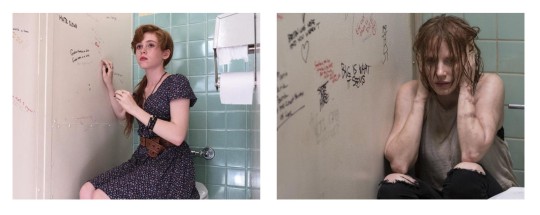
Outside of pedophilia and sexual abuse, Chapter One’s real horror is mostly coded, symbolic, left up to (admittedly rather obvious at times) interpretation. It’s just under the surface and we’re meant to be distracted by the fact that, allegorical or not, there’s still a very creepy thing hunting our protagonists from the shadows. For two hours we take on a child’s perspective, biting our nails at all the things we once imagined hid inside our closets. We’re scared because they’re scared.
That mindset irrevocably changes once your group grows up. Forty-year-olds simply don’t freak out in the same way a bunch of thirteen-year-olds would, especially now that they know precisely what’s happening and have the mental fortitude to combat it. At least to an extent. Chapter Two isn’t as traditionally scary for the simple reason that the film now acknowledges what all adults eventually must: there’s nothing in the closet, there’s nothing hiding under your bed. Or if there is, it’s something tangible that can be handled with a calm(ish) demeanor and a well-placed ax. An adult might scream when something jumps out at them, but they’re not as inclined to cower. Adults might still be scared, but they’re better able to push that fear aside in order to take action. The group first reached that point in the sewers--- “Welcome to the Losers’ club, asshole!”---and now fully embodies that mindset with nearly three decades of growth and experience to draw on. This is why Ben investigating the library as a teen reads as teeth-chatteringly scary, but Ben and Bill as adults investigating the skateboard produces only a comment about how they're getting used to this nonsense. They know, and we as the audience know, what the real threat is and whether or not we need to shield our eyes when something starts clunking its way down the stairs.
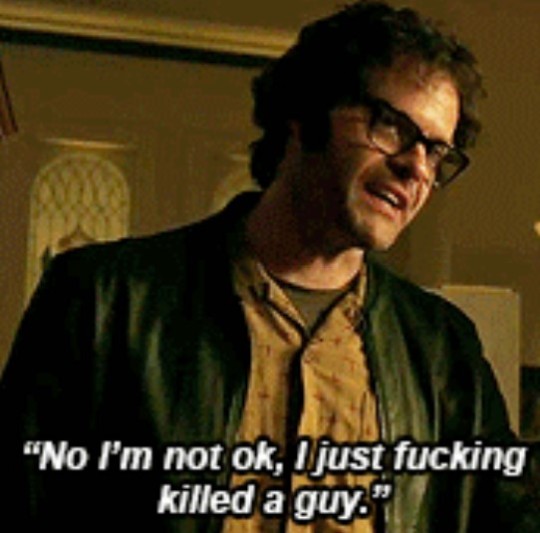
All of which isn’t to say that Chapter Two isn’t scary. It’s simply scary in a much more realistic manner, killer clowns and Native American rituals aside. The fears have been aged-up along with the cast, stripping away the child-like fantasies that made us wet our pants in Chapter One. What’s the scariest moment outside of the jump scares? When two men and a kid beat a gay man and then chuck him in the river to drown. You’ll note that, unlike in the first film, Pennywise doesn’t actually have to do much work here. Seasoning people up with fear? The rest of the world is doing that for him. That first scene detailing a truly horrific hate crime (which, by the way, is based off of true events) results in a meal delivered straight to Pennywise’s arms. It’s people who targeted that couple, beat one of them within an inch of his life, and then tossed him over a bridge, bleeding and shrieking for help. All Pennywise had to do was scoop him from the water and take that first bite. He’s incidental to the film’s most cringe-worthy scene. We can argue all we want about how it’s Pennywise’s influence that “makes” the town this way, but any queer viewer knows that's simply not the case. In 2019 we're still living this horror, no Pennywise required.
Likewise, the two children we see murdered are much more overtly grappling with fears that have nothing to do with fantastical monsters. Dean, the little boy Bill tries to save in lieu of Georgie, is rightly petrified because a seemingly crazy adult is now stalking him. We as the audience know that Bill is just trying to help----that he’s not the real danger here----but that’s not the perspective this kid has, nor is it the issue the film is grappling with. We first see him approaching an idol of his, Richie, and instead of an enjoyable experience he winds up getting yelled at. The It films are only tangentially interested in the status of fans and their relationship with celebrities, but we know it’s a common theme for King’s work overall. Look at Misery and look at this cameo: a disenchanted fan of the 21st century, criticizing a writer’s novel and leveraging him for money. “You can afford it,” he tells Bill, swindling him simply because he can. The context of this little boy as a fan and Richie as the older, bigger, larger-than-life comedian adds another layer to the interaction. It’s not just an adult verbally attacking a child, it’s an adult this kid worshiped enough to recognize and quote his material from memory. Who easily walks away from that?
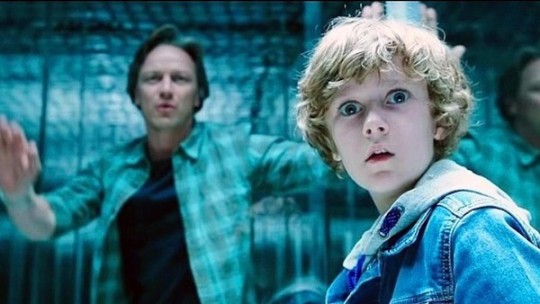
This little boy then finds Bill shrieking at a sewer opening, is manhandled by him, and told in the scariest way possible, born of Bill’s own fear, that he has to get out of dodge, fast. There are scary things out there, Dean freely admits that he’s heard kids’ voices coming from the tub drain, but right now the scariest thing is how badly the adults in his life are failing him: parents (from what little we can gather) are distant, his comedic idol is mean, and now this stranger is traumatizing him in the middle of the street. Once again, it’s easy to see how Pennywise isn’t needed to sow fear or even enact cruelty; he’s not a requirement for horrible things in the world, he’s merely their reflection. We see the same setup with the little girl under the bleachers. That scene demonstrates precisely how not scary Pennywise is. Here’s this child putting aside her discomfort over his looks and agreeing to be his friend. What’s worse than a clown with a creepy expression? The knowledge that all the other kids have already rejected you because of a birthmark on your face. Bullying is the far greater threat and one we’re 100% more likely to deal with in our lives than a killer clown, so the second film re-frames Pennywise to better acknowledge this. He’s scary because things like bullying and neglect exist to give him an easy in. He’s even scary because in this moment, hiding under the bleachers, manipulating this little girl, he’s fully embodying a child predator. Chapter One was a primal, “There’s a monster hiding in the shadows” kind of fear. Chapter Two is a, “We’re all going to die from climate change” kind of fear. Logical and largely inescapable. Characters like Richie don't need Pennywise to take some fantastic form to scare him. Homophobia has already done all the work.
Ultimately, I think of this as the Umbridge Effect. Who’s the most hated character in the Harry Potter franchise? I’ll give you a hint, it’s not the Dark Lord responsible for two wars, attempted genocide, and the death of our title character.

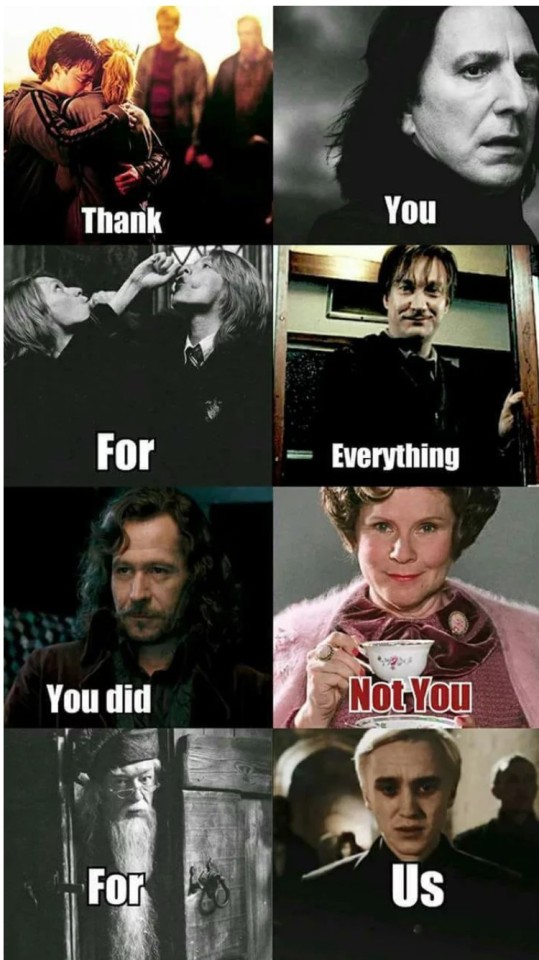

We despise Umbridge because she’s real. She’s relatable. She’s grounded in a way that Voldemort could never hope to be. We have no fear that an all-powerful sorcerer is suddenly going to come out of the woodwork and attempt to enslave and/or eradicate everyone without magic. That’s just not on our list of things to worry about. A corrupt politician, however? An instructor who uses her power to emotionally and physically torture students, getting away with it because of a cutesy, hyper-feminine persona? We’ve seen stuff like that. We’ve lived it. Umbridge represents all the real wrongs in the world when it comes to bigotry and privilege. Therefore we hate her---we fear her---in a way we could never hate or fear Voldemort. Now, in It: Chapter Two, Pennywise is the new Voldemort. Is an alien clown with an unhinged jaw and three rows of teeth technically scary? Sure, but it doesn’t hold a candle to the real problems that plague the cast: abuse, anxiety, depression, suicidal ideation, the fear that someone will hurt or outright kill you over some part of your identity. These are things we continue to fear long after the credits roll and the lights come up, and they’re now barely coded in the story:
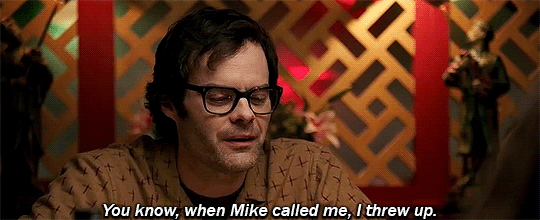
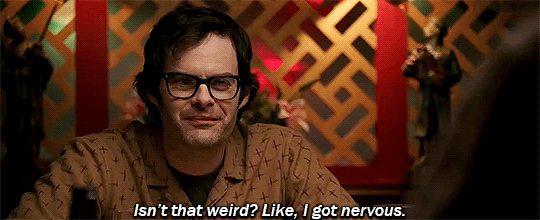
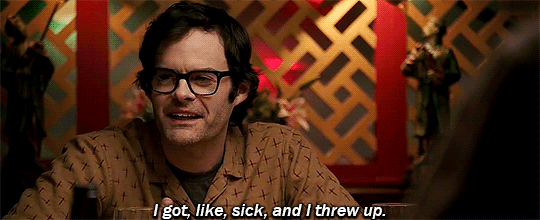
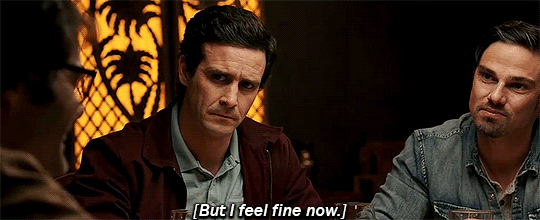
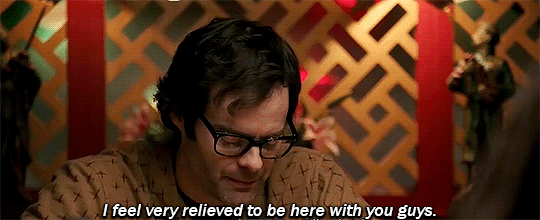
It occurred to me halfway through my viewing that the people laughing at the characters’ new plights were the same ones who didn’t flinch when a gay man’s head cracked into the pavement. I had both hands over my mouth during that scene and I wasn’t snickering whenever Eddie had a panic attack, or Ben’s self-confidence took a hit. Because those moments, like our opening, hit pretty close to home for me; I didn’t find them embarrassingly humorous in the way much of my theater did. So many reviews in the last two months have insisted that Chapter Two isn't scary, but I think that depends entirely on whether or not you're struggling with these now explicit threats. We're not dealing with mummies and creepy portraits anymore. Instead, tell me how you feel about holding your partner's hand in public. Do certain memories make you vomit? Or freeze? Consider heading upstairs to the bath? The horror is dependent on how the audience views Bill's stutter coming back, or the bruises on Bev's arms.
The cast grew up. It’s a fantastic twist. It also means that the horror needed to grow up with them, resulting in a film that could no longer function as a simple, scary clown movie. Our ending reminds us of that. When did people laugh the loudest? When the Losers’ club was bullying Pennywise into something vulnerable. And yeah, I get it. It’s a cheesy moment that we feel the need to laugh at because it’s just so unexpected. Awkward, even. Since when are badass horror monsters defeated with a bit of backyard peer pressure straight out of middle school? If this were any other story, Pennywise would have been defeated by Eddie’s poker. The most scared member of the group finally finds his courage! He has faith that this simple object can kill monsters! He throws it in a perfect arc, splitting the deadlights in two! That’s a heroic ending. Something epic and fantastical, relying on the idea that the Good Guys will win simply because they believe in themselves... but that’s not how the real world works. That ending is a child’s fantasy. Sometimes you do the heroic thing and end up dying anyway. Which isn’t to say that the heroic thing is useless. It saves Richie’s life. It’s just that a single act can’t cure all our ills in the way that storybooks often claim they can.
How then does an adult deal with huge, intangible problems like bigotry and mental illness---the things Pennywise now fully represents? By saying “Fuck you” to those things again and again with all the support you can possibly wrangle up at your side. You refuse to let those issues control you; you drag those child-like representations into the light and remind yourself just how small they really are. We don’t get to beat something like depression by spearing it with a fire poker in some overblown finale. If we did, we’d all be having a much better time. All you can do is band together with friends and scream that you’re not going to let your fears define you anymore. Pennywise is a symptom of all the true horrors in the world. Sadly, you can’t beat those with a baseball bat. But you can acknowledge the heart of the issue, literally in the case of five friends squeezing until that one symptom, at least, is gone.
Image Credit
#1:https://www.screengeek.net/2018/07/10/it-chapter-2-character-mashups/
#2:https://earlybirdbooks.com/the-re-read-the-lion-the-witch-and-the-wardrobe
#3:https://www.vox.com/culture/2019/7/4/19413771/stranger-things-season-3-review-recap-hopper-elevenrussians
#4:https://comicbook.com/movies/2019/08/08/harry-potter-movies-review-10-years-late-snape-dumbledore-franchise/
#5:https://www.denofgeek.com/us/tv/netflix/277257/give-the-dragon-prince-a-chance
#6:https://www.forbes.com/sites/lindamaleh/2019/04/23/she-ra-and-the-princesses-of-power-season-2-review/#ec7022c42953
#7:https://www.commonsensemedia.org/tv-reviews/avatar-the-last-airbender
#8:https://www.newsweek.com/buffy-vampire-slayer-turns-20-charisma-carpenter-shows-enduring-legacy-and-566123
#9:http://theinspirationroom.com/daily/2009/alice-in-wonderland-the-movie/
#10:https://www.hindustantimes.com/tv/game-of-thrones-this-edited-out-scene-between-bran-and-sansa-reveals-so-much-about-finale/story-qFDHflH2dO6Kcki1wgsEyM.html
#11:https://www.cinemablend.com/new/Why-Ender-Game-Best-Possible-Adaptation-Book-40110.html
#12:https://www.hollywoodreporter.com/live-feed/supernatural-end-season-15-cw-1196579
#13:https://www.slashfilm.com/it-chapter-two-scene/
#14:https://www.vox.com/culture/2017/9/12/16286316/it-cleaning-up-blood-scene-feminism
#15:http://www.allocine.fr/film/fichefilm-208633/photos/detail/?cmediafile=21647122
#16:https://stanleyyuris.tumblr.com/post/188300897715/chaotic-losers
#17:https://whatculture.com/film/it-chapter-2-every-character-ranked-worst-to-best?page=3
#18:https://www.reddit.com/r/harrypotter/comments/7uhrkz/the_most_hated_character/
#19:https://9gag.com/gag/am2X2Z4?ref=pn.mw
#20:https://screenrant.com/harry-potter-hated-characters-unpopular-worst-ranked/quickview/17
GIFs1-5:https://the-pretty-poisons.tumblr.com/post/188344826978/why-is-everyone-looking-at-me-\like-this
70 notes
·
View notes
Text
@yikes-trademarked
i mean yeah, the post has nothing to do with it just comes across as a bit of a slap in the face to people who are genuinely oppressed in a modern day society. how are asexuals ‘neglected’ and ‘isolated’? so most people experience sexual attraction and you don’t, whoop de doo. nobody actually cares if you do or don’t experience sexual attraction. if you could please give me an actual, real life, not someone-calling-you-a-plant-online example of asexual discrimination then i’ll take back my words
___
@yikes-trademarked I super love how instead of apologizing you are doubling down. Okay. I'll give you examples. Here are some general prejudices that affect aro and ace people. They aren't in any real order.
•Until the DSM V asexuality was considered a mental illness. Despite the fact that now we are "allowed" to "identify" as asexual HSDD (Hypoactive sexual desire disorder) is STILL considered a disorder. So instead of trying to help a person accept themselves as asexual allosexual (nonace) doctors will try to "fix" someone if they want to. Asexuality is still seen as something to be cured. It is still a dysfunction in their eyes, they just hide their prejudice a little better.
•Asexuals have been harrassed and raped in an attempt to fix them. Asexuals and aromantics are often seen as a "challenge" to be harassed into affection.
•Mainstream Christianity discriminates against asexuals as they do other queer identities. Here is one quote from a document called "Asexuality and Christianity" produced for Asexual Awareness Week (the fact that we get "awareness" rather than "pride" ain't great either)
"While celibacy is officially considered a good stance in religion, declaring oneself disinterested in sex is often met with disapproval. Asexuals have been told that they are rejecting God's gift of sexuality, that they are just as bad as homosexuals because they are not 'normal'...or people decide to pray to God for them to be fixed or for the Almighty to send the right person for them to fall in love with."
Or from the horse's mouth "Question: What do you call a person who is asexual? Answer: Not a person. Asexual people do not exist. Sexuality is a gift from God and thus a fundamental part of our human identity. Those who repress their sexuality are not living as God created them to be: fully alive and well." This was written by two Jesuit priests David Nantais and Scott Opperman. In other religions this is also often true. I know more about Christianity personally but I know similar doctrines exist in Islam and Orthodox Judaism. Not to mention the notion that marriage is the only acceptable option in these religions (unless you are Catholic clergy) and children are a necessity. Hell, according to the conservative traditional gender roles of these religions even an otherwise gender conforming aro/ace doesn't fit (not marrying, no kids, no family, all that).
•Dehumanization from all sides. We are told to be human is to love and that love is nearly always put in romantic or sexual context. Indeed NOT being capable of or experiencing romantic or sexual love is often used as shorthand for someone being a bad person (As Dexter [from Dexter], for example, becomes more sympathetic he develops the ability to feel sexual/romantic love. Robots in fiction can be asexual and aromantic but only if you want to show them as apart from humanity. Once you want to make it clear they have a soul they have to experience some kind of romantic urge or longing. Like Data from Star Trek) An article in Psychology Today by Dr. Gordon Hodson Ph.D. (who specializes in studying dehumanization) postulates (with a study to back it up) that asexuals are the most dehumanized sexual minority.
•On the specifically romantic asexual front in many places do not consider a marriage valid until it has been consumated.
•In media in which asexuality and aromanticism are not proof of evil they are judged to be not real. Here is one of if not our first actual representation in media. In the film Nymphomaniac the SELF-PROCLAIMED asexual character turns out to be a rapist who the protagonist murders in what is supposed to be a "woo! You go girl!" moment. AT BEST this says asexuals aren't real. We're just sexually repressed misanthropes. It might also imply that asexuals are base animals who are waiting to strike. THAT IS ONE OF THE FEW TIMES THE WORD ASEXUAL IS EVEN USED IN MAINSTREAM FILM! I cannot think of a single other.
•We are erased constantly in real life and in media. Here are two examples of active erasure, Jughead Jones (canonly aro/ace in the comics and coded as such since day one) was straight-washed for Riverdale. You may say "oh maybe they didn't know" (which is bullshit) then consider example two: Sherlock Holmes. Holmes (who I adore) has long been one of the few characters that has been "allowed" to aro/aces, but when the creators of BBC's Sherlock were explicitly asked if he was aro/ace they said he absolutely wasn't.
This is part of what I am talking about. We are not allowed to exist. We are invisible.
•Asexuals and aromantics are somehow toxic in our mere existence. We make kids think it is okay to be like us and are poisoning their young minds. We hate sex and thus are against the sex positivity movement.
•"Virgin" is an insult and we are treated as constant children. Somehow we have failed to grow up and cannot be treated as adults.
•And here is what I was really talking about SOCIETY IS NOT MADE FOR US! CULTURE IS NOT CONDUSIVE TO OUR EXISTENCES! I didn't know asexuality was an option until I was about 24. And before that I, like many aro/ace people, put myself in a lot of situations and relationships to "fix" myself. To make myself normal. My first and only sexual encounter was one of the things that sent me spiralling into a serious depression. I didn't know that it was okay to not be interested and to say "no.". So I said "okay" because I thought it was what I had to do to be a normal teenager. I don't know if I ever shared that online before so congrats you got me so mad I revisited my personal trauma. From childhood we are told falling in love is the ultimate reward. As teens we are told we gotta get laaaaaid. As adults not being involved in a sexual/romantic (often indistinguishable) relationship is WEIRD and TROUBLING. I have been told by people who don't know I am asexual that asexual people are "too weird" or even "creepy." The idea that someone might not be capable of romantic love sets off people's red flags that said aromantic might be crazy.
•We are surrounded by sex and romance constantly. Constantly. It is inescapable. In your real life I want you to pay attention to romantic or sexual imagry and storylines around you. There is no break. No alternative. This is what I mean by "invisible at best."
•Also, we are denied a history. It is very hard to prove absence but often sexless figures are immediately dubbed to be gay/lesbian because of their lack of interest in "appropriate" gender. Forgetting entirely that asexuality and aromanticism are options. Then when the question is raised they maybe a figure WAS aro and/or ace we are told that we are """"stealing"""" history. There is like one person in history we are allowed: Nikola Tesla. I love him very much, but he also fits the bill as a weirdo asexual. Because anyone who was the least bit acceptable to society must be allosexual. An example in reverse, Queen Elizabeth I, Britain's most beloved monarch, who never married, never was romantically or sexually involved with anyone (aside from being assaulted as a teenager), and was in her era very famously THE VIRGIN QUEEN who used her virginity as part of her persona to great affect. She is not considered asexual or aromantic and never has been. I have seen a biographer bend over backwards to get away from that accusation including using an incident where an elderly Elizabeth flashed a dignitary to make him uncomfortable as proof that she was allo. We can't have this awesome historical figure be one of those creeps right?!
•i am not even going into the history of how "sexlessness" was historically treated, especially in women. Let me just say that "spinsterism" was considered a danger to children and young women.
•NOTICE I WENT THIS WHOLE POST WITHOUT MENTIONING ASSHOLES WHO USE THE DISK HORSE AND BAR US FROM QUEER CIRCLES EVEN THOUGH SOME STUDIES FIND ASEXUALS HAVE LOWER SELF ESTEEM THAN ANY OTHER QUEER GROUP AND WOULD REALLY BENEFIT FROM A COMMUNITY!! THIS POST IS ENTIRELY EXAMPLES OF NON ONLINE PEOPLE BECAUSE SOMEHOW YOUR CONSTANT ABUSE OR REFUSAL TO RECOGNIZE ABUSE IS A-OKAY BECAUSE IT IS PART OF "THE DEBATE" BECAUSE SOMEHOW OUR EXISTENCE IS ACCEPTABLE DEBATE!
These are just some examples. People are free to add more but I am tired. If you want links I will dig them up.
Sincerely,
Fuck you.
I apologize for the "fuck you" but the exclusionist attitude is so disheartening. It is bad for not only aros and aces but also the queer community in general. We should be in this together! Fighting for one another side by side! We should be there for each other for hardships and for celebrations. I think it is vital that exclusionists really examine what and who they are actually fighting against.
32 notes
·
View notes
Note
what are your thoughts on King Aerys's Kingsguard? Do you think they were honorable knights are toadies who didn't uphold their vows?
Oof, that’s a loaded question. Bear with me because I have thoughts.
The Kingsguard are vital to GRRM’s interrogation of knighthood and his definition of a true knight; we’re meant to see how hard it is to live up to the ideals of knighthood in a world that allows for conflicting vows, how good knights in service to a bad cause handle it, how many of them dare to question the system itself, and how that reflects on their view of themselves and of the institution as a whole. Living up to the chivalric code is freaking hard which is precisely why it is the mark of a true knight.
So we have the kingsguard as a model of how crooked the current system is: this is an institution that is universally viewed as the embodiment of the chivalric code but its fundamental flaw -- the fact the their vows to the king are taken to supersede their original vows to “be just [..] protect the young and the innocent [..] defend all women” even though the knighthood oath is the foundation on which the Kingsguard oath is built upon - effectively compromises that same code, exposing its oath to be hollow in practice and presenting a conflict of morality that so many of the revered knights in Westeros fall to.
And that’s exactly what happened with Aerys’ Kingsguard – they took their oaths to obey and protect the king, even if they morally opposed his actions, to be of paramount importance and to be held above all else. Barristan Selmy’s reflection on his role during Aerys’ reign, though it shows his shame and regret for doing nothing in the face of Aerys’ atrocities, still show his belief that he was honor-bound by his Kingsguard oath to do exactly that.
Barristan Selmy had known many kings. He had been born during the troubled reign of Aegon the Unlikely, beloved by the common folk, had received his knighthood at his hands. Aegon’s son Jaehaerys had bestowed the white cloak on him when he was three-and-twenty, after he slew Maelys the Monstrous during the War of the Ninepenny Kings. In that same cloak he had stood beside the Iron Throne as madness consumed Jaehaerys’s son Aerys. Stood, and saw, and heard, and yet did nothing. But no. That was not fair. He did his duty. Some nights, Ser Barristan wondered if he had not done that duty too well. He had sworn his vows before the eyes of gods and men, he could not in honor go against them … but the keeping of those vows had grown hard in the last years of King Aerys’s reign.
The same sentiment is, more or less, echoed in Gerold Hightower and Jonothor Darry’s response when Jaime, ironically the only person to question the flaw in the system, struggled with the idea that he was just supposed to stand there and watch the king commit crimes without doing anything about it.
“As for Lord Rickard, the steel of his breastplate turned cherry-red before the end, and his gold melted off his spurs and dripped down into the fire. I stood at the foot of the Iron Throne in my white armor and white cloak, filling my head with thoughts of Cersei. After, Gerold Hightower himself took me aside and said to me, ‘You swore a vow to guard the king, not to judge him.’
The day he burned his mace-and-dagger Hand, Jaime and Jon Darry had stood at guard outside her bedchamber whilst the king took his pleasure. “You’re hurting me,” they had heard Rhaella cry through the oaken door. “You’re hurting me.” In some queer way, that had been worse than Lord Chelsted’s screaming. “We are sworn to protect her as well,” Jaime had finally been driven to say. “We are,” Darry allowed, “but not from him.”
Hightower’s, Darry’s and Selmy’s stance isn’t surprising when you consider what we’re told of the Kingsguard’s oath.
The first duty of the Kingsguard was to defend the king from harm or threat. The white knights were sworn to obey the king’s commands as well, to keep his secrets, counsel him when counsel was requested and keep silent when it was not, serve his pleasure and defend his name and honor.
Keep silent when counsel is not requested. Serve the king’s pleasure. That’s their duty. That’s what the system is telling them they are honor-bound to uphold and what they are expected to prioritize over their knighthood oath, standard morals, and even their own personal judgement. That is the standard rule of the Kingsguard - obey without question, regardless of what’s asked of you. Tommen’s Kingsguard were utterly baffled when Jaime pointed out that blind obedience to the king isn’t a good thing. Arthur Dayne and Oswell Whent helped Rhaegar spirit away a 15 years old girl and isolate her in Dorne, then probably kept her there regardless of her wishes. They all considered this an integral part of their service.
This entire situation raises a difficult question about conflicting vows (“no matter what you do, you’re forsaking one vow or the other”); what a knight to do when duty and “honor” as accepted by society conflicts with basic ethical and moral code. Note that this is not just the view of the Kingsguard themselves, this is accepted Westerosi view. Ned Stark bore no ill-will towards Barristan Selmy who stood by and let his father and brother be brutally murdered without a trial, he was sad about having to fight Hightower, Dayne and Whent who were his sister’s gaolers. Robert Baratheon refused to have Barristan killed on the Trident because he wouldn’t kill a man for loyalty. He revered him for standing by his king, even though his loyalty meant that he enabled and defended a mass murderer.
But of course accepted Westerosi view means jack shit. Just because the system is corrupt does not mean the Kingsguard (or any knight, since all knights are expected to obey their lieges) are magically absolved of any blame or responsibility for their choices. The system was flawed when Jaime Lannister chose his knightly vows and recognized that blind obedience to a tyrant wasn’t acceptable. The system was flawed when Dunk risked his life going against Prince Aerion to protect Tanselle, and when he stood up to Eustace Osgrey once he discovered his lies. The system was flawed when Baelor Breakspear and Raymun Fossoway took a stand for Dunk, and when Brienne said of Ser Quincy Cox “he could have tried, he could have died”, and then went on to fight a hopeless fight to protect the children at the inn knowing that she would die. The system was flawed when Davos risked Stannis’ anger and retribution by smuggling Edric Storm out of Dragonstone. Knights take their vows willingly, accepting the responsibility and solemn duty to keep those vows and to stand up for those who can’t even if it meant their death; failing to do so in the name of duty to a tyrant is not good enough. That oath of obedience is no excuse. I generally find that accepting the idea that these knights did not have a choice or that there is a way to defend their actions buys into the rhetoric of Meryn Trant who would have us believe that he was completely justified in hitting 12-year-old Sansa, perhaps even that there was “honor” in it, simply because the king ordered it and he was sworn to obey the king. That it’s a thought process that could easily devolve to absolving the likes of Gregor Clegane and Amory Lorch of their crimes just because they were following the orders of their lord to whom they swore an oath of obedience.
But it’s not like we don’t have examples of knights, even in Aery’s Kingsguard, either subverting or outright going against their vows to the king because they applied their own moral judgement and recognized that they shouldn’t obey the king. There’s Jaime Lannister obviously, but also, Arthur Dayne and Oswell Whent - possibly Gerold Hightower as well - owed their allegiance to Rhaegar instead of Aerys, probably because they couldn’t handle Aerys’ madness and the way he was leading the realm to ruin…. but then they showed the same blind obedience to Rhaegar’s orders regarding Lyanna and saw Robert as merely a usurper. Which isn’t really an improvement. They just transferred the object of that obedience from one person to another. But this still shows that they were capable of finding wiggle room within their vows when recognizing that the king shouldn’t be obeyed without exception and that there were cases where disobeying the king was the correct course of action.
Now we can’t paint all the Kingsguard who followed the sentiment of prioritizing the king’s orders above all else, even when the king was evil, with the same brush - if we do, we’d be missing a crucial part of GRRM’s commentary on both the Kingsguard and knighthood. Because not every man who follows that sentiment is a vile monster or a terrible person. While Meryn Trant or Boros Blount are truly vile people who think nothing of abusing a child, or worse, think they were in the right to do so, we have Arys Oakheart who was ashamed of hitting Sansa and who tried to argue but ultimately participated in her abuse anyway, and we have Barristan Selmy who is also ashamed of standing as a silent witness to Aerys’ crimes but tries to rationalize it. It goes a long way in emphasizing that evil does not triumph just because bad people do evil things, it also triumphs when good - or relatively good - men do nothing.
That’s why I can’t talk about Aerys’ Kingsguard as a monolith entity when they obviously had different stances and views of the bounds of their oath. Jaime Lannister questioned the system and ultimately rejected the notion of putting the king’s orders first regardless of the cost when he chose the half-million lives inside King’s Landing over his oath to the king. Arthur Dayne, Oswell Whent and possibly Gerold Hightower took liberties with their oath based on their moral judgement but instead of applying the same morals to Rhaegar, they just transferred their obedience from one person to another and ultimately followed the same sentiment. Barristan Selmy “did his duty” and suppressed his moral questions, as it appears Jonothor Darry did. Lewyn Martell…. Oh, who the hell knows, we have so little information about him (sigh, George), but while it’s safe to say he was Team Rhaegar initially, Elia and her children’s captivity during the Rebellion certainly complicate his position later on.
I tend to think that most of these knights fall under the category of the good men who did nothing or “did their duty” and let injustice prevail. They were no toadies but they most definitely broke their knightly vows. Challenging the system is hard, speaking up against an authority is hard, but it’s only through that difficulty - that test - that a true knight is made. They should have tried, even if it meant their death. They took oaths to protect the innocent and the weak but they squandered them. Aerys’ Kingsguard were not true knights; not one of them, from Barristan Selmy to Arthur Dayne to Gerold Hightower. They are no Duncan the Tall or Brienne of Tarth.
#asoiaf#asoiaf meta#the kingsguard#knighthood#barristan selmy#jaime lannister#arthur dayne#oswell whent#gerold hightower#jonothor darry#lewyn martell#meryn trant#boros blount#chivalric code#so many vows...they make you swear and swear#ask box#Anon asks
271 notes
·
View notes